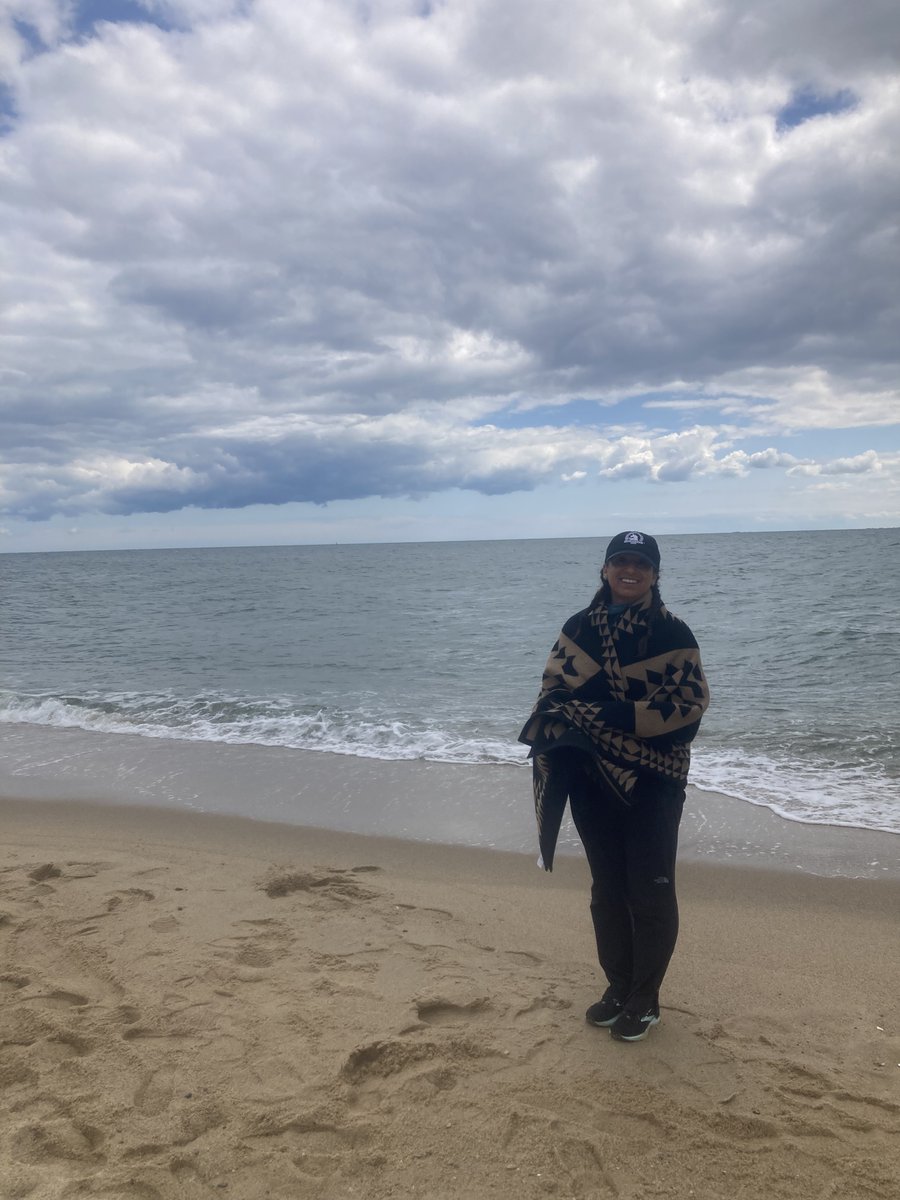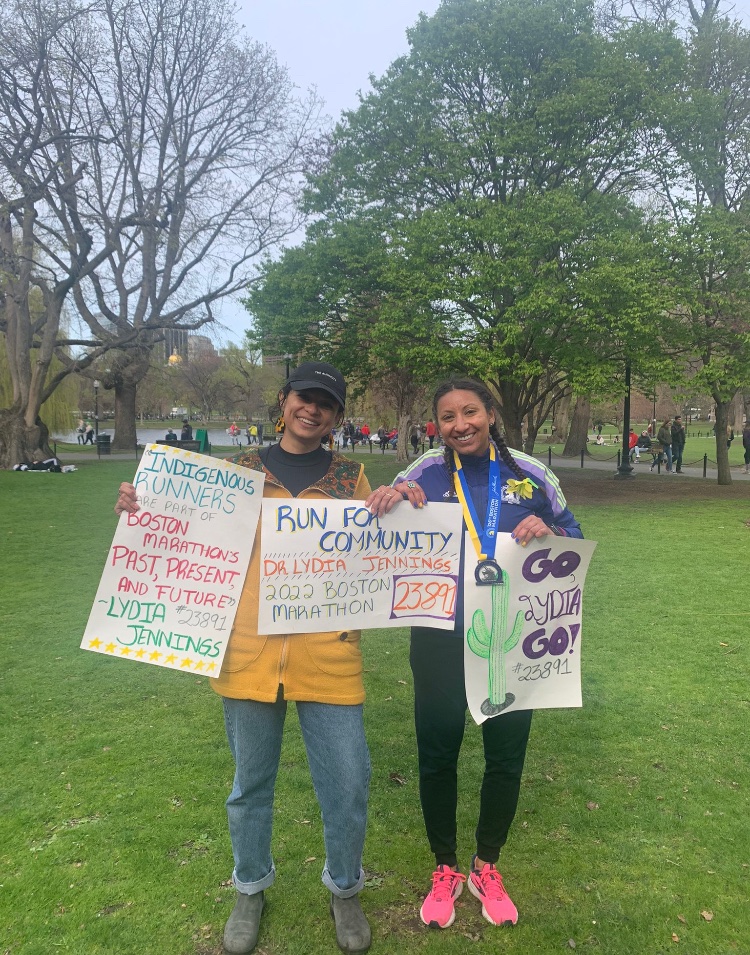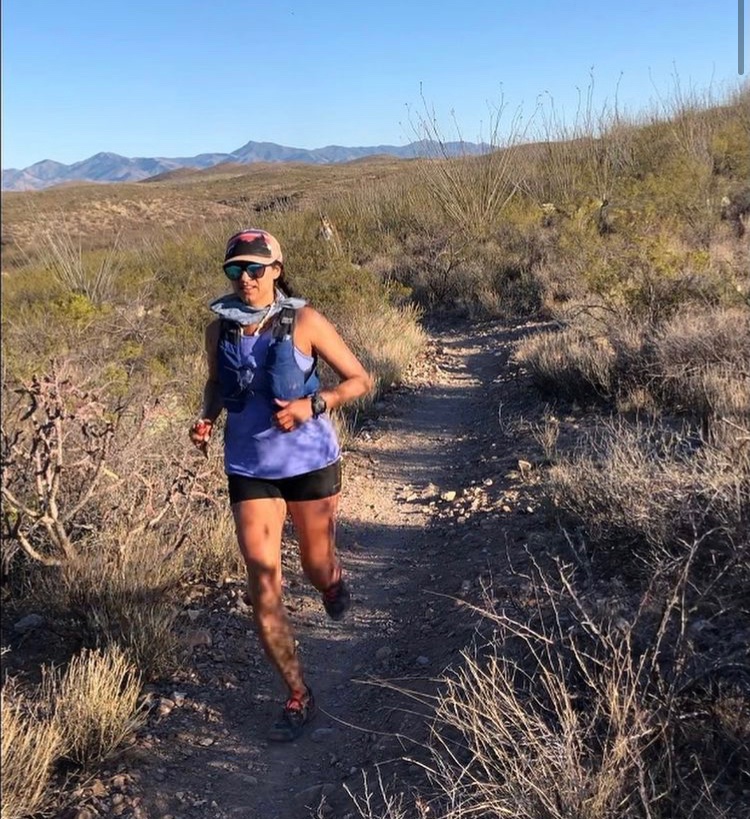
Monday I ran #Boston126 on the 50th anniversary of women running the Boston Marathon. Because this is a once in a lifetime event for me (I'm a trail runner at heart!), I dedicated my run to highlighting examples of #landback. 🧵 



Each mile was dedicated to a tribal nation who has fought, purchased or gifted their land back, written out on the back of my shirt. This is by no means an exhaustive list and did not include federal land trust cases (didn't want to make this too complicated).
Land is one of the greatest resources for tribal nations across the country. Some 56 million acres are held in trust by the federal government for tribes. That's approximately 2 percent of the country. However, 90 million acres were taken by the United States between 1887
and 1934 through the Allotment Act, termination and, sometimes, illegal actions.
As an environmental scientist who studies Indigenous land stewardship practices, I've been thinking deeply about #landback and its role in addressing biodiversity loss and the #climatecrisis.
As an environmental scientist who studies Indigenous land stewardship practices, I've been thinking deeply about #landback and its role in addressing biodiversity loss and the #climatecrisis.
To me, #Landback is the reclamation of our land relations, kinship relations, our language, our ceremonies, our food traditions, our education practices (often land based), our housing and healthcare, and governance!
It truly is the embodiment of what so many Indigenous community organizers, community Experts & knowledge holders, Indigenous lawyers, Indigenous scientists, and Indigenous historians have fought for. It is the reclamation of identity.
Leanne Betasamosake Simpson describes land relations as providing “place-based ethical framework” that enables “process-centered modes of living that generate profoundly different conceptualizations of nationhood and governmentality—ones that aren’t based on enclosure,
authoritarian power, and hierarchy” (L. Simpson 2017).
Unpacking and thinking about land means to understand the physical and metaphysical in relation to the concepts of place, territory, and home” (Goeman 2015).
Unpacking and thinking about land means to understand the physical and metaphysical in relation to the concepts of place, territory, and home” (Goeman 2015).
Prior to this run, I have spent time visiting with different tribal nations out here on the East Coast-- learning from what we in the Southwest call "first contact tribes."
Many Americans think this first contact is part of the past-- but many communities today are still reeling with the ripple impacts of settler colonial contact, still fighting to reclaim identity & recognition despite having contracts with the British Crown before the American Gov
And so, I felt even further supported to run the marathon amplifying so many Nations and their continued fights for resiliency.
Here we go!
Mile 1 was dedicated to the Suquamish Tribe of Washington. In 2004, the state parks and recreation commission voted to transfer the 1-acre Old Man House State Park -- home of the Indian chief for whom Seattle was named -- to the Suquamish Tribe. seattlepi.com/local/article/…
Mile 2 was dedicated to the Lipan Apache Tribe of Texas, who in 2021, had their cemetery returned-- the reclamation of relatives and ability to steward their resting places. cnn.com/2021/11/05/us/…
Mile 3 was dedicated to Ponca Tribe in Nebraska. In 2018 farmers Art and Helen Tanderup gifted 1.6 acres along the historic Ponca "Trail of Tears," and the route of the proposed Keystone XL tarsands export pipeline. boldnebraska.org/in-historic-fi…
Mile 4 was dedicated to the Wyandotte Nation of Oklahoma, who had land returned to them in their traditional lands of Ohio (that's right--they were relocated). In 2019, 3 acres were returned by the United Methodist Church. washingtonpost.com/religion/2019/…
Mile 5 was dedicated to the Passamaquoddy Tribe in Maine, who in 2021 had a 3.2-acre waterfront parcel re-acquired. Members of the tribe refer to the land as N’tolonapemk, which means “our relatives’ place.”
mainepublic.org/environment-an…
mainepublic.org/environment-an…
Mile 6 was dedicated to the Coeur d’Alene Tribe in Idaho. In 2001 the Diocese deeded the mission & property to the Tribe. Ownership of the mission was a meaningful achievement for the Tribe, whose ancestors built and worshipped at the mission. sah-archipedia.org/buildings/ID-0…
Mile 7 was dedicated to Kalispel Tribe, also in Idaho. In 2021, the Kalispel Tribe was "gifted" with a parcel of Moose Mountain from Kanisku Land Trust and The Idaho Club. krem.com/article/news/c…—%20The%20Kalispel%20Tribe,27%2C%202021.
Mile 8 was dedicated to the Iroquois Confederacy in NY, who in 2012 had 100 acres of sacred land located adjacent to Cohoes Falls in Waterford, New York returned by Brookfield Renewable Power Company. indiancountrytoday.com/archive/brookf…
Mile 9 was dedicated to the Klamath Indian Tribe of California, who in 1988 had 110 acres from the United Methodist Church.
"The Church members see it as a point of justice for the church to not be in the land-taking business of the Indians." oregonnews.uoregon.edu/lccn/sn9305071…
"The Church members see it as a point of justice for the church to not be in the land-taking business of the Indians." oregonnews.uoregon.edu/lccn/sn9305071…
Mile 10 was dedicated to the Eastern Band of Cherokee Indians in Tennessee. In 2020, 198 acres were reacquired. It's known locally as Dumplin Creek, whose name comes from a treaty signed by the Cherokee Nation in 1785. indianz.com/News/2020/02/0…
Mile 11 was dedicated to the Wiyot Tribe of CA, who in 2019 had Duluwat Island returned. The Wiyot People believe Duluwat Island is the physical and cultural center of the universe, a sacred piece of land with the power to bring balance to all else.
northcoastjournal.com/NewsBlog/archi…
northcoastjournal.com/NewsBlog/archi…
Mile 12 was dedicated to the Narragansett Indian Tribe of Rhode Island who in 1991, had 350 acres returned (valued at $1.37 million), because the previous land owners could no longer could afford to pay taxes on the land. latimes.com/archives/la-xp…
Mile 13: Dedicated to the Rappahannock Tribe of Virginia, who reacquired 465 acres of sacred land at Fones Cliff in 2022! The Tribe plans to expand their "Return to the River" program that trains youth in in traditional river knowledge and practices. cnn.com/2022/04/02/us/…
Mile 14: Dedicated to the Sinkyon Council of CA, who partnered with the non-profit "Save the Redwoods League" to acquire 500 acres of land dubbed Tc’ih-Léh-Dûñ, or “Fish Run Place,” in the Sinkyone language.
abcnews.go.com/US/wireStory/c…
abcnews.go.com/US/wireStory/c…
Mile 15: Dedicated to the Penobscot Nation's (Maine) 735 acres reacquired from the Elliotsville Foundation in 2020. The parcel of land that connects two Penobscot-held land plots.
mainebeacon.com/returning-land…
mainebeacon.com/returning-land…
Mile 16: Dedicated to the Squaxin Island Tribe of WA, where the Port Blakely Companies, a family-owned company with timber operations, transferred 875 of shoreline, tideland and upland forest to the ancestral stewards in 2021.
opb.org/article/2021/1…
opb.org/article/2021/1…
Mile 17: (The beginning of the Newton hills!) was dedicated to the Chickahominy Tribe in Virginia, who in 2021 received $7 million in state funding to acquire & preserve tribal lands & improve water quality in the Chesapeake Bay watershed. virginiamercury.com/2021/09/09/va-…
Mile 18: Dedicated to the Port Gamble S’Klallam Tribe of WA, who worked with Pope Resources to purchase 937 acres of timberland and tidelands adjacent to the reservation for conservation and restoration uses. pgst.nsn.us/images/s-klall…
Mile 19 was dedicated to the Esselen Tribe of California (the lands where I did my undergrad!) who in 2020 worked with the Western Rivers Conservancy via funding from the California Natural Resources Agency to acquire 1199 acres.
Whats amazing about this example is that 250 years after they were stripped of their ancestral homeland & seen as a landless tribe in one of the most beautiful sections of CA, the Esselen tribe is once again legally reunited with their ancestral homelands.
Can you imagine how huge this victory is for this Nation?! theguardian.com/us-news/2020/j…
Mile 20 (aka Heartbreak Hill Mile, famously called so when Elliot “Tarzan” Brown of the Narragansett Tribe beat local favorite John Kelly on this hills after Kelly tapped him on the shoulder). If you want to learn more Brown, check out this article newenglandhistoricalsociety.com/tarzan-brown-n…
Ok, Mile 20 was dedicated to the Maidu Tribe reacquiring 2325 acres in CA. As part of a 2003 bankruptcy settlement, Pacific Gas & Electric transferred 2,325 acres in the Humbug Valley to the Maidu Summit Consortium, comprised of 9 Maidu Mountain Tribes.
The property is within the ancestral territory of the Mountain Maidu and contains soda springs, ceremonial and spiritual sites and Maidu ethnobotanical resources. mynspr.org/news/2019-09-2…
Are you getting tired yet?! Because I was!! Final 6 miles to go… Stay strong!
Mile 21 was to the Santa Clara Pueblo of New Mexico--the state lands that raised me--who in 2000 reacquired 5000 acres with the help of funding from Lannan Foundation! This enabled Santa Clara Pueblo to purchase P'opii Khanu, the headwaters of Santa Clara Creek,...
which have been alienated from the tribe since 1860. The headwaters were part of a larger parcel, called the Baca, which the federal government wanted to buy in order to establish the Valdes Caldera National Preserve.indiancountrytoday.com/archive/lannan…
Mile 22 was dedicated to the Colville Tribe of WA, who worked with the Conservation Northwest to purchase 9200 acres. The purchase is meant to preserve a wildlife habitat corridor & hand stewardship of the land over to tribes who originally occupied it. spokesman.com/stories/2021/o…
Mile 23 (omg this was the hardest stretch for me) was dedicated to the Nez Perce Tribe of Oregon, who in 1996 partnered with the Trust for Public Lands, to purchase 10,300 acres. This is land the Nez Perce called Hetes'wits Wetes, or Precious Land.
This historic project restored the land to Nez Perce stewardship precisely 120 years after Chief Joseph and his people were driven from their lands in one of the last of the Indian wars in 1877. tpl.org/our-work/chief…
Mile 24 was dedicated to the Leech Lake Band of Ojibwe in Minnesota, who saw land returned in December 2020. Chippewa National Forest is to transfer 11,760 acres of forest service lands to be held in trust for the Leech Lake Band of Ojibwe as part of the reservation.
The lands to be transferred back to the reservation were illegally transferred by the Interior to the Chippewa National Forest in the 1940s and 50s without consent of the band or individual allottees.indiancountrytoday.com/news/tribes-re…
Mile 25! Almost done!!!! This is where I started to pick up the pace!
Mile 25 was dedicated to the Snoqualmie Tribe in California, where recently (2022), 12,000 acres of its ancestral forestlands in the Tolt River Watershed were acquired. The forest has significant cultural, historic, environmental, and economic value to the Tribe
and is near the lands originally promised to the Tribe -- a promise the United States did not keep By acquiring these lands, the Tribe is concluding a decades-long effort to reclaim ownership in an area that is enormously important to the Tribe. snoqualmietribe.us/snoqualmie-tri…
My final mile was dedicated to those whose homelands I was running on & whose reservation I had the pleasure of visiting the day before the marathon — to the Mashpee Wampanoag! 

In 2022, the U.S. Department of the Interior gave them substantial control of roughly 320 acres around Cape Cod. The decision opens the door for the Wampanoag tribe to move forward on economic development projects. washingtonpost.com/history/2021/1…
Gotta say, running down Boylston Street in a landback skirt, hearing people yell landback to me, sent chills down my spine. It was beautiful, totally propelled me to the finish line, and is an experience I will never ever forget.
I hope a few things stand out to people from this list, as they did for me: the range of where #landback is happening — which states are and are not represented. This list is not complete, and many Nations are continuing to work towards #landback
I found who is doing landback interesting too— excited to see so many land trust partnerships, industry partnerships returning lands & even religious groups— curious what this means for the future
... especially that we have enough Indigenous land managers to steward these sacred landscapes!
if individuals are interested in learning more about land transfers, and how to return land to a tribe near you, I thought this was a pretty helpful guide to get started! d3n8a8pro7vhmx.cloudfront.net/theselc/pages/…
Another note-- though this year was the 50th year of women running the Boston Marathon (sooooo awesome!) let's be sure to note that it celebrates white women running. The first Black woman to run Boston was Marilyn Bevans, in 1975, who placed 4th. nytimes.com/2022/04/18/spo…
The first Indigenous woman to run Boston (I think!) is Patti Dillion (Mi’kmaq tribe) who ran in 1979, 1980 and 1981. Celebrating intersectional sheros is important! This year I was one of 9 Indigenous women running Boston-- and we represented our People!
I love running with intention and purpose. This run was totally out of my element -- so much city! But dedicating these miles to the long term work of landback made it so meaningful. If you care about time, I finished in 3: 57, slower than I wanted, but below my goal of 4 hours
Thanks for following along and learning with me! And HUGEEEEEE thank you to my friend @MelanieGarate for making these incredible signs for me, finding me at mile 23 and giving me the power hug to keep me going! 

Oh also, you notice I have a yellow flower in my hair-- that is to demonstrate my solidarity with Ukraine and communities who are experiencing modern day colonization. Indigenous communities understand this too well. rampantmag.com/2022/03/solida…
Lastly, in case you wanted to see my ‘fit, including the skirt I ran in, front and back. The handprint in front is in solidarity with the other Native women running for #MMIWG and to demonstrate the connection between violence against land & violence against women. 



• • •
Missing some Tweet in this thread? You can try to
force a refresh




